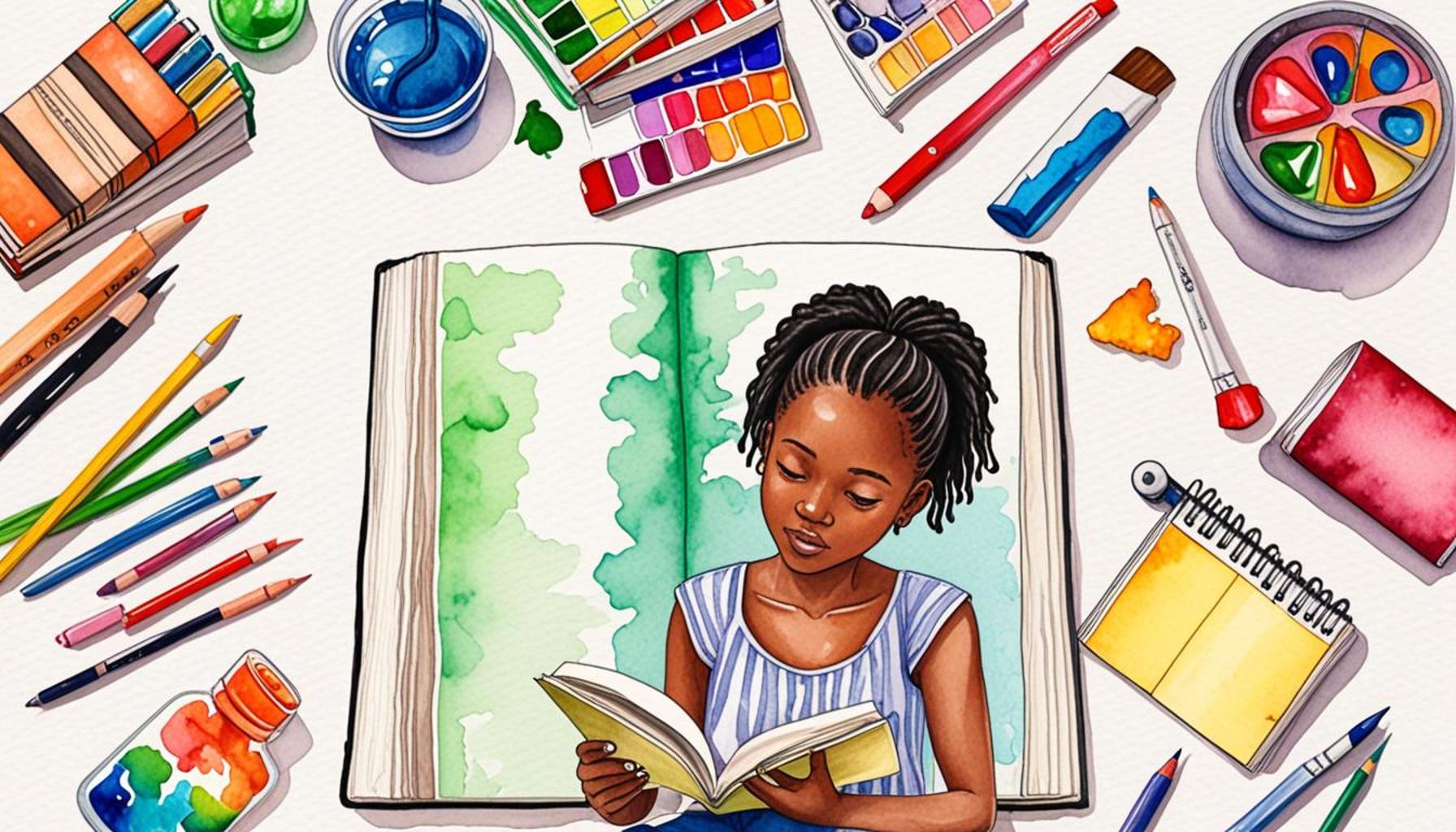How Reflective Journaling Can Enhance Self-Knowledge and Self-Discovery

Unlocking the Power of Reflective Journaling
In today’s fast-paced world, understanding oneself can often take a back seat. Reflective journaling offers a powerful tool for self-exploration and personal growth. By putting pen to paper, individuals can uncover deeper layers of their thoughts and emotions, fostering a meaningful connection between the inner self and external experiences. This practice engages the mind in a dialogue that promotes self-awareness and authenticity.
Benefits of Reflective Journaling
- Enhanced Clarity: Regular writing encourages clearer thinking and allows for a better understanding of personal motivations. It often leads to epiphanies about one’s values, beliefs, and priorities. For example, journaling about daily interactions can reveal patterns that might be influencing decisions, allowing for a mindful shift in behavior.
- Emotional Release: Journaling acts as a safe space for expressing feelings that might otherwise go unvoiced. In a culturally rich and diverse nation like Nigeria, where many individuals might suppress their emotions due to societal expectations, reflective journaling provides an outlet. Writing about experiences such as family dynamics, career pressures, or societal norms can lead to catharsis and, ultimately, emotional healing.
- Goal Setting: It helps in identifying aspirations and tracking personal progress over time. By documenting goals, individuals cultivate a sense of accountability. For instance, a young professional in Nigeria aiming for a promotion can outline their goals and regularly journal about milestones achieved, challenges faced, and adjustments made to their path.
In Nigeria, where cultural expectations and societal pressures can influence self-perception, journaling serves as a refuge. It offers a dedicated platform for individuals to reflect on their experiences and beliefs. This practice is particularly vital in educational and professional environments that often prioritize conformity over individuality. Moreover, it can be a daily practice that fosters resilience and emotional intelligence, equipping individuals to navigate the complexities of their surroundings.
Get Started with Reflective Journaling
- Choose a quiet space for writing. A serene environment minimizes distractions and creates a conducive atmosphere for introspection.
- Set aside dedicated time, even if it’s just 10 minutes a day. This could be in the morning to set intentions or at night to reflect on the day’s events.
- Allow your thoughts to flow freely without judgment. Embrace the process of writing, knowing it is about self-discovery rather than perfection.
As you embark on this journey of self-discovery through reflective journaling, the insights gained can pave the way for profound transformations. By embracing this practice, not only can you gain clarity about your life’s direction, but you can also develop a deeper understanding of your emotions and aspirations. Ready to explore the depths of your own mind? Start today and witness the incredible changes that unfold.
ADDITIONAL INSIGHTS: Expand your understanding here
The Transformative Effects of Reflective Journaling
Reflective journaling is not just a fleeting trend; it is a profound practice that empowers individuals to delve into the uncharted territories of their minds. Many people in Nigeria find themselves grappling with the incessant noise of societal expectations and daily pressures, often leading to a disconnection from their true selves. Engaging in regular reflective journaling can help bridge this gap, facilitating a deeper understanding of personal identity and nurturing self-discovery.

The Process of Self-Reflection
At its core, reflective journaling is a structured process that invites individuals to pause, breathe, and reflect on their experiences. It allows for the exploration of thoughts that often swirl chaotically in one’s mind, turning confusion into clarity. By setting aside time to write, individuals are prompted to ask themselves important questions:
- What are my core values and how do they influence my decisions?
- What emotions do I experience regularly, and what triggers these feelings?
- What patterns emerge in my interactions with others?
- What aspirations do I hold, and what steps am I taking to achieve them?
These questions serve as guideposts in the reflective journaling journey, leading to revelations that foster self-knowledge and illuminate paths for personal growth. The act of writing down thoughts and feelings enables one to see situations from different angles, often revealing insights that might remain hidden in the daily bustle of life.
Cultural Relevance and Personal Empowerment
For many Nigerians, where societal norms can be restrictive and often dictate personal choices, reflective journaling becomes a vital outlet for authenticity. It provides a non-judgmental space to challenge preconceived notions about identity, success, and happiness. In a culture that often venerates consensus, the solitary act of journaling encourages individuals to celebrate their uniqueness and personal narratives. As one writes, it is possible to confront and reframe regrets, aspirations, and fears in a constructive way, fostering a sense of resilience.
Moreover, in an era where mental health is receiving much-deserved attention, journaling can serve as a therapeutic practice. It allows individuals to articulate stresses stemming from work pressures, family dynamics, or societal expectations. By committing thoughts to paper, individuals can process emotions and develop healthier coping mechanisms, ultimately contributing to a more stabilized mental state.
Through reflective journaling, individuals embark on a journey that not only enhances self-knowledge but also cultivates a sense of empowerment. Each entry becomes a testament to growth and discovery, an ongoing dialogue with one’s self that can lead to transformative changes. With such powerful outcomes on the horizon, the question remains: what insights lie patiently waiting within you?
| Advantage | Description |
|---|---|
| Enhances Emotional Intelligence | Reflective journaling encourages individuals to articulate their emotions, leading to better understanding and management of feelings. |
| Facilitates Personal Growth | Through regular reflection, individuals identify patterns in their thoughts and behaviors, fostering empowerment and progress toward personal goals. |
How Reflective Journaling Can Enhance Self-Knowledge and Self-Discovery is a topic that resonates with many seeking clarity and understanding in their lives. By embracing reflective journaling, individuals uncover not just their thoughts but also the underlying motivations that drive them. This process facilitates heightened self-awareness, ultimately guiding people to make more informed decisions. Additionally, this practice encourages a safe space for individuals to explore their values and beliefs, often revealing unexpected insights that can lead to profound changes. With time and consistency, reflective journaling can transform one’s approach to challenges, fostering resilience and adaptability.Moreover, this form of self-exploration is deeply personal and can vary greatly from one individual to another, making it a unique journey that promotes comprehensive self-discovery. The benefits of incorporating reflective journaling into daily practice are diverse and can lead to an enriched life experience filled with clarity and purpose.
LEARN MORE: This related article may interest you
Unlocking Creativity and Problem Solving through Reflection
Reflective journaling not only aids in understanding oneself, but it also serves as a powerful tool for unlocking creativity and enhancing problem-solving skills. In a constantly evolving landscape, especially in Nigeria where innovation and adaptability are paramount, harnessing one’s creative potential is more important than ever.
Creativity Blooming on the Pages
The process of writing allows individuals to step away from traditional thought patterns, encouraging a flow of ideas that may not surface in day-to-day activities. As one engages with their thoughts through journaling, it becomes a lens to view concepts from fresh perspectives. For instance, artists, writers, and entrepreneurs often find that reflective journaling helps them brainstorm solutions to challenges they face, transforming vague notions into concrete ideas. By explicitly noting down inspirations, individuals can uncover connections between experiences and develop novel solutions that mirror their unique perspectives and cultural contexts.
Furthermore, reflective journaling can cultivate a habit of continuous learning. When individuals document newly acquired knowledge or insights, it reinforces the learning process and paves the way for innovative thinking. This is particularly relevant in Nigeria, where the fusion of traditional practices with modern advancements creates a unique environment for creative exploration. The content produced through journaling can serve as a repository of ideas, allowing individuals to revisit and refine their thoughts over time, enhancing creativity along the way.
Navigating Challenges with Enhanced Clarity
Life is often fraught with challenges, and journaling provides an effective means to navigate these difficulties. Nigerian youths, in particular, may feel overwhelmed by the high expectations thrust upon them by their families and society. Reflective journaling can help demystify the complexity of these pressures, enabling individuals to break down monumental tasks into manageable steps. By analyzing concerns in writing, one can unveil hidden fears and rationalize overreactions, leading to more effective decision-making.
- Am I allowing societal norms to dictate my goals?
- What obstacles am I facing in my personal and professional life, and how can I overcome them?
- What lessons can I draw from past failures that will inform my future choices?
- How can I integrate my cultural heritage into my aspirations?
These reflective prompts compel individuals to confront their realities, thereby positioning themselves to respond rather than react to life’s challenges. More importantly, reflecting on personal struggles cultivates emotional intelligence—an essential skill in today’s interconnected world.
In essence, reflective journaling is a multifaceted tool that plays a crucial role in the journey of self-discovery and personal growth. By fostering both creativity and clarity, it empowers individuals in Nigeria to not only understand themselves better but also challenge and redefine the narratives that shape their identities. As you put pen to paper, think about how these reflections can forge pathways to awareness and purposeful action in your everyday life. What transformative thoughts are waiting to be met with the ink of reflection?
CHECK OUT: Click here to explore more
Conclusion: The Transformative Power of Reflective Journaling
In summary, reflective journaling serves as a vital catalyst for enhancing self-knowledge and self-discovery, fostering both creativity and clarity in one’s life. As individuals in Nigeria navigate the complexities of their cultural and societal environments, engaging in the practice of journaling provides a unique outlet for introspection. It empowers them to confront personal challenges, break free from limiting thought patterns, and explore innovative pathways to self-realization.
Moreover, the act of writing allows individuals to document their thoughts, ideas, and emotional experiences, transforming them into meaningful insights. This process not only nurtures creativity but also reinforces the habit of continuous learning. By revisiting previous entries, individuals can track their growth and evolve their understanding of self, ultimately leading to profound self-discovery.
Reflective journaling also encourages emotional resilience, enabling individuals to face societal expectations and pressures with greater confidence. The thought-provoking prompts outlined earlier inspire deeper inquiry into personal motivations, aspirations, and the integration of cultural heritage into one’s life narrative. In this way, journaling becomes a powerful tool for questioning the status quo and redefining personal identity.
As you embark on your journaling journey, consider the potential for transformative insights waiting to be uncovered. Allow your reflections to illuminate the path toward self-awareness and deliberate action while harnessing the power of your unique experiences. With each written word, you are not just chronicling your life but actively engaging in a profound journey of self-discovery that has the potential to reshape your future.


